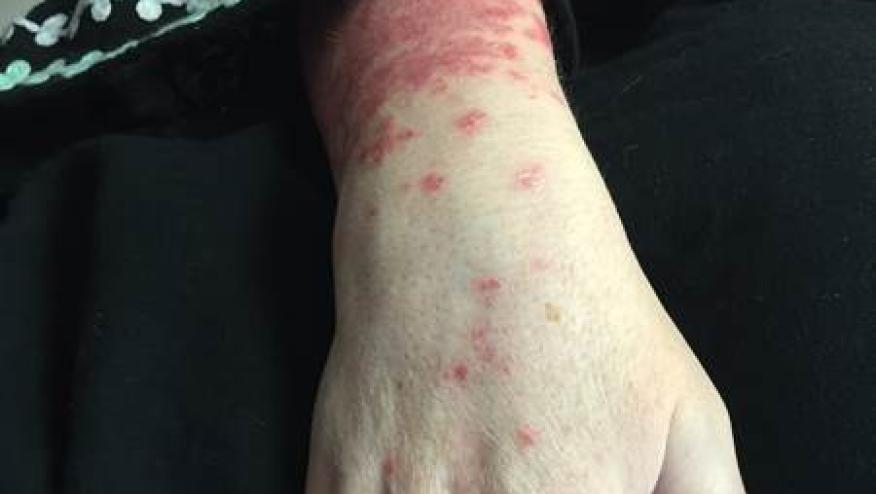Apremilast in DMARD-Naive Psoriatic Arthritis Save

Apremilast (Otezla) monotherapy was effective for psoriatic arthritis among patients who had not previously received disease-modifying anti-rheumatic drugs (DMARDs) or biologics, a phase III clinical trial funded by the drug's manufacturer found.
At week 16, a 20% improvement on the criteria of the American College of Rheumatology (ACR20) was seen in 15.9% of patients receiving placebo compared with 28% of those receiving oral apremilast, 20 mg twice per day (P=0.0062) and 30.7% of those given the phosphodiesterase-4 inhibitor in dosages of 30 mg twice per day (P=0.0010), according to Alvin F. Wells, MD, of the Rheumatology and Immunotherapy Center in Franklin, Wisconsin, and colleagues.
In addition, improvements in function on the Health Assessment Questionnaire Disability Index (HAQ-DI) were significantly greater than with placebo (0.03) for patients in the 20-mg group (-0.17, P=0.0008) and the 30-mg group (-0.21, P<0.0001), the researchers reported online in Rheumatology.
The current study, called Psoriatic Arthritis Long-term Assessment of Clinical Efficacy (PALACE 4) is the fourth phase III trial of apremilast in patients with active psoriatic arthritis. PALACE 1, 2, and 3 evaluated the drug in patients who had previously been exposed to conventional DMARDs or biologics.
"PALACE 4 assessed apremilast use earlier in the treatment algorithm in patients with active psoriatic arthritis," and the current report includes the first 52 weeks of a planned 5-year international trial, the researchers explained.
The mean age of the patients was 50, and slightly more than half were women; almost all were white.
The mean duration of psoriatic arthritis was 3.4 years. Mean swollen joint count was 11, and mean tender joint count was 20. Enthesitis was present in 65% of patients, and dactylitis in 50%. Psoriasis affecting at least 3% of the body surface area was present in 58%.
At baseline, almost three-quarters of the participants were using nonsteroidal anti-inflammatory drugs, but fewer than 10% were taking oral corticosteroids.
A total of 527 patients were enrolled. At week 16, patients who had not had at least a 20% improvement in their swollen and tender joints were given early escape and considered to be nonresponders, and at week 24 any patients still on placebo were re-randomized to one of the active treatment groups.
Apremilast treatment was associated with improvements on a wide array of secondary endpoints at week 16. For instance, ACR50 responses were observed in 4.5% of patients receiving placebo compared with 11.4% of patients in both apremilast dosage groups (P<0.05). On the modified Psoriatic Arthritis Response Criteria, response rates were 24.4% in the placebo group versus 38.9% in the 20-mg group (P<0.005) and 45.5% in the 30-mg group (P<0.0001), while changes on the Disease Activity Score in 28 joints (DAS28) were -0.16, -0.62, and -0.67 (P<0.0001 versus placebo for both apremilast groups).
Also at week 16, the percentages of patients having a 50% improvement in the Psoriasis Area and Severity Index (PASI-50) were 19.4% in the placebo group compared with 44.2% in the 20-mg group (P<0.005) and 45.9% in the 30-mg group (P<0.0001), although significant differences were not seen for the PASI-75.
By week 52, ACR20 responses were seen in 53.4% of patients who had been on apremilast 20 mg throughout and in 59.7% of those originally randomized to placebo and then switched to the 20-mg group. ACR20 responses at that time point were seen in 58.7% of those on 30 mg throughout and in 56.7% of the placebo and 30-mg groups.
Benefits also persisted through week 52 on various other efficacy endpoints, the researchers found. Changes on the HAQ-DI at that time point were -0.21 and -0.25 for the placebo/20-mg group and placebo/30-mg group, and -0.32 and -0.39 for the groups on 20 mg and 30 mg throughout the trial, respectively. Changes in DAS28 were -1.1 and -1.3 in the placebo/20-mg group and placebo/30-mg group, and -1.4 for the 20- and 30-mg groups.
PASI-50 results were maintained at 1 year for 50% and 46.4% of the placebo/20-mg and placebo/30-mg groups, respectively, and by 61.5% and 56% of the 20- and 30-mg groups.
The most common adverse events were diarrhea, nausea, and headache, which were reported most often during the first 2 weeks. Three serious infections (none opportunistic) occurred. There was one myocardial infarction, in a 65-year-old man with hypertension, obesity, and dyslipidemia. No clinically meaningful laboratory abnormalities were seen, and no deaths occurred.
"Apremilast led to clinically meaningful improvements in the signs and symptoms of psoriatic arthritis, physical function, and psoriasis up to 52 weeks," the authors concluded, adding that the drug was generally well tolerated.
Limitations of the study, the researchers said, were the inclusion of patients who had relatively longstanding disease even though they were DMARD- and biologic-naive, and the fact that combination therapy was not allowed, possibly limiting the generalizability of the findings.
The study was sponsored by Celgene.










If you are a health practitioner, you may Login/Register to comment.
Due to the nature of these comment forums, only health practitioners are allowed to comment at this time.